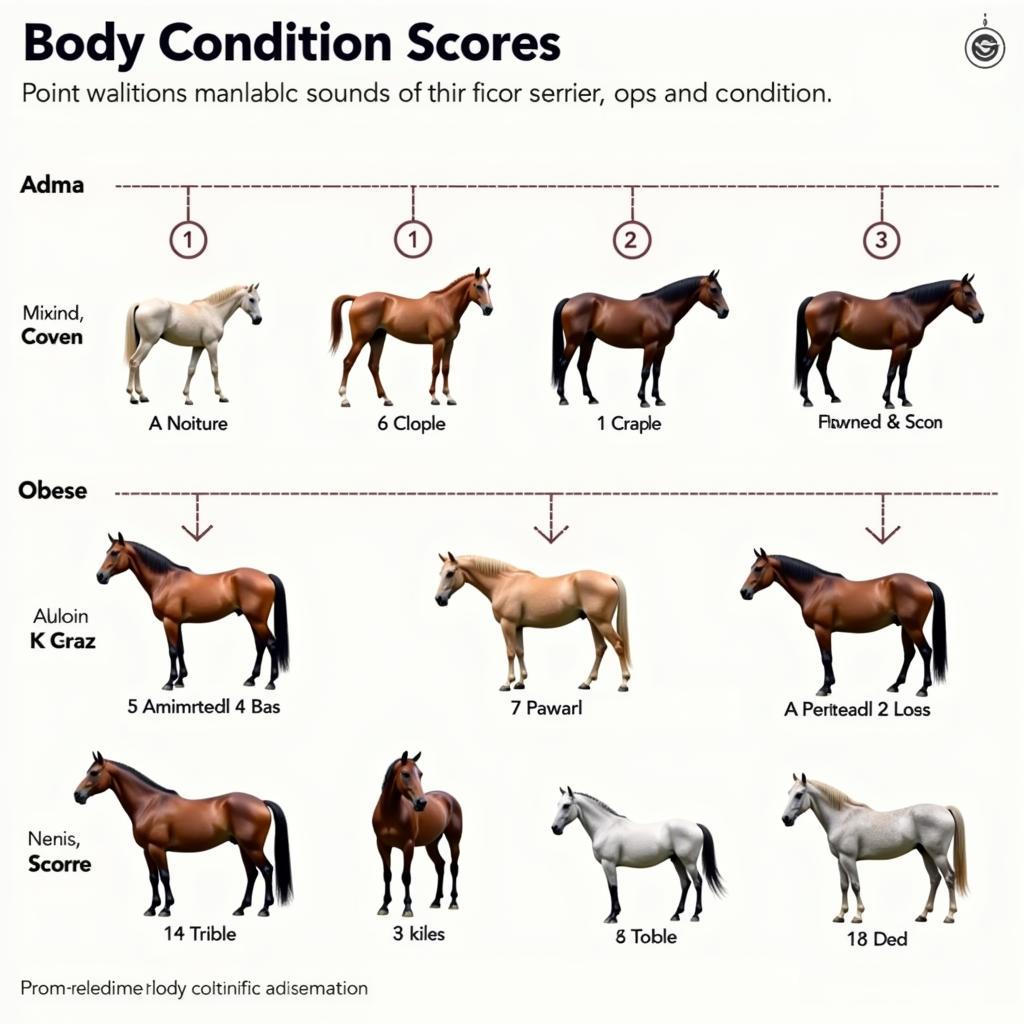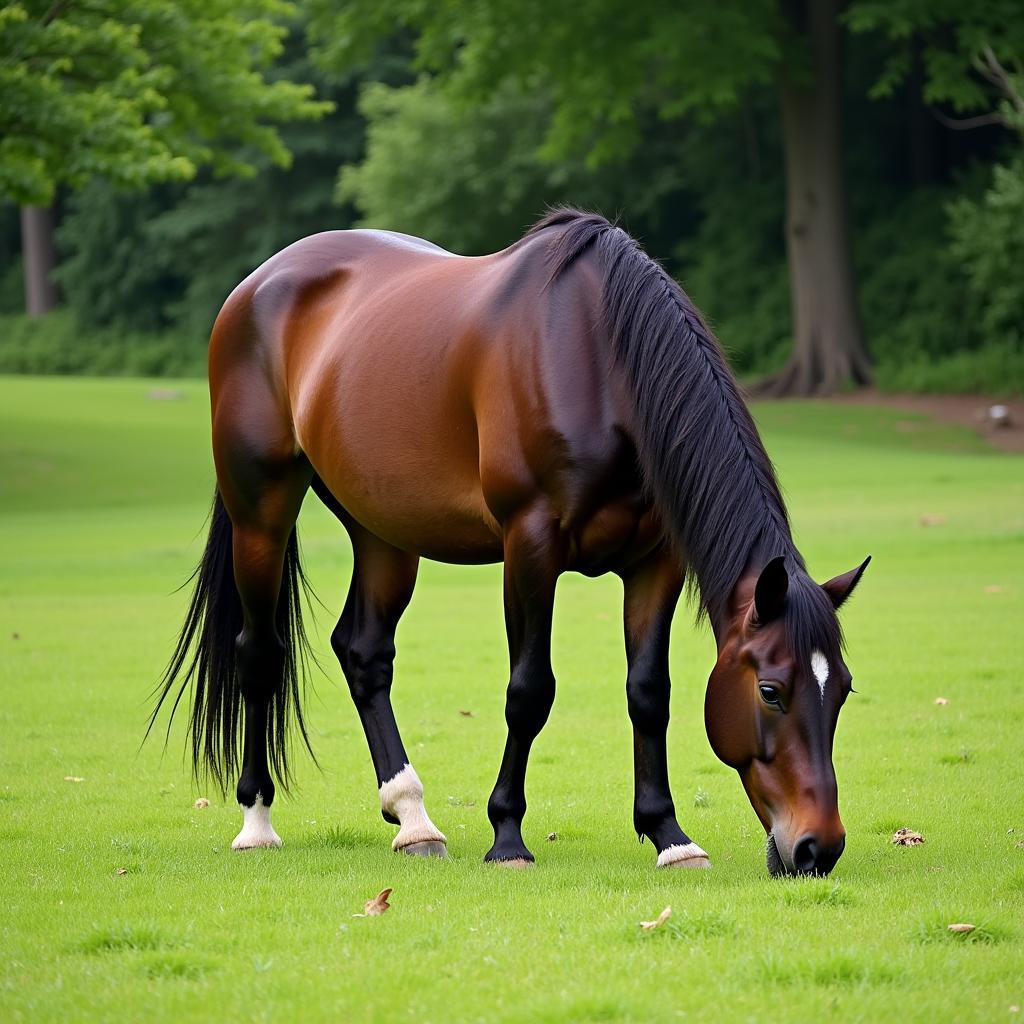Swat For Horses – the term itself might sound alarming, but it’s a crucial aspect of horse care that every owner should be familiar with. In essence, “swat” refers to the layer of fat that lies beneath a horse’s skin, serving as a vital indicator of their overall health and well-being. Just like we monitor our own weight and body condition, understanding how to assess and manage a horse’s swat is fundamental to ensuring they lead a long, healthy life.
What Exactly is Swat on a Horse?
You might hear experienced horse people talking about a horse’s “cover” or “condition,” and often, they’re referring to the amount of swat the horse is carrying. This subcutaneous fat layer is more than just padding; it plays a critical role in:
- Insulation: Swat helps regulate body temperature, keeping horses warm in the winter and acting as a buffer against extreme weather conditions.
- Energy Reserves: Just like in humans, fat stores energy. A healthy layer of swat provides reserves that horses can draw upon during periods of increased activity, illness, or reduced food availability.
- Overall Health Indicator: A horse’s swat level can be a visual cue to their overall health status. Sudden changes in swat can signal underlying health problems that require veterinary attention.
Assessing Your Horse’s Swat
You don’t need fancy equipment to get a good read on your horse’s swat level. There are three main areas to focus on:
- The Neck: Feel along the crest of your horse’s neck. In a horse with adequate swat, you should be able to feel the neck muscles easily, but there should be a smooth layer of fat over the top.
- The Ribs: Run your hands gently along your horse’s rib cage. You should be able to feel the ribs, but they shouldn’t be prominent or sharp.
- The Tailhead: Feel the area at the base of the tail. A healthy horse will have a rounded tailhead with some cushioning from swat.
 Horse Body Condition Score Chart
Horse Body Condition Score Chart
Factors Affecting Swat in Horses
A variety of factors influence a horse’s ability to maintain a healthy swat layer. These include:
- Diet: The foundation of good swat is a balanced diet. Horses need quality forage, such as hay or pasture, as well as appropriate amounts of grain or concentrates depending on their workload and metabolism.
- Workload: Just like athletes, horses burn more calories when they are in work. Horses in heavy training or those used for demanding disciplines will require more calories to maintain their swat.
- Age: Older horses tend to lose muscle mass and have more difficulty maintaining swat, especially as their teeth wear down and they become less efficient at digesting food.
- Genetics: Some breeds are genetically predisposed to being “easy keepers” and put on swat readily, while others are naturally leaner and require more careful management.
- Health Conditions: Underlying health issues, such as dental problems, parasites, or metabolic disorders, can all impact a horse’s ability to maintain a healthy weight and swat layer.
When Swat Becomes a Concern
While a healthy layer of swat is crucial for horses, too much swat can lead to health problems, just as too little can.
Obesity in horses is a growing concern, and it increases the risk of:
- Laminitis (inflammation of the hooves)
- Insulin resistance
- Joint stress
- Heat intolerance
Weight loss and inadequate swat can be equally serious, indicating potential issues such as:
- Inadequate nutrition
- Parasites
- Dental problems
- Underlying diseases
If you notice significant changes in your horse’s swat, it’s essential to consult your veterinarian to rule out any underlying health conditions and develop a management plan.
Maintaining a Healthy Swat Level: Tips for Horse Owners
- Regular Body Condition Scoring: Make it a habit to assess your horse’s body condition regularly. You can use a body condition scoring chart to help you.
- Provide Quality Forage: The cornerstone of a horse’s diet is forage. Ensure they have access to plenty of fresh, clean hay or pasture.
- Adjust Feed According to Workload: If your horse’s workload increases, adjust their feed accordingly to ensure they are receiving enough calories.
- Dental Care: Regular dental checkups are crucial for horses, as dental problems can make it difficult for them to chew and digest food properly.
- Parasite Control: Follow a regular deworming schedule recommended by your veterinarian to prevent parasites from robbing your horse of vital nutrients.
 Healthy Horse Grazing
Healthy Horse Grazing
The Importance of Veterinary Guidance
Remember, every horse is an individual, and there’s no one-size-fits-all approach to managing their swat. Your veterinarian is your best resource for determining the ideal weight and body condition for your horse based on their breed, age, activity level, and overall health.
Swat for Horses: A Key to Well-being
While the term “swat” might not be glamorous, understanding its importance is a fundamental part of responsible horse ownership. By regularly assessing your horse’s swat, providing them with a balanced diet, and working closely with your veterinarian, you can help ensure they stay healthy, happy, and ready to perform at their best.
FAQ:
1. What should I do if my horse is losing weight rapidly?
Sudden weight loss is always a cause for concern in horses. Contact your veterinarian immediately to determine the underlying cause.
2. How often should I body condition score my horse?
It’s a good idea to assess your horse’s body condition at least once a month, or more frequently if you have concerns about their weight.
3. Can I feed my horse extra grain to help them gain weight?
While grain can provide calories, it’s crucial to consult your vet before making significant dietary changes. Excessive grain can lead to digestive issues and other health problems.
4. Is it normal for my older horse to be thinner?
Older horses may naturally lose some muscle mass and have more difficulty maintaining weight. However, it’s essential to ensure they are receiving adequate nutrition and dental care.
5. What is the best way to prevent obesity in my horse?
A combination of a balanced diet, appropriate exercise, and regular veterinary checkups is key to preventing obesity in horses.
Looking for More Information on Horse Care?
Check out these helpful resources on our website:
Need personalized advice for your equine companion? Contact Justus Horses USA today!
Phone: 0772127271
Email: [email protected]
Location: QGM2+WX2, Vị Trung, Vị Thuỷ, Hậu Giang, Việt Nam
Our team is available 24/7 to answer your questions and provide expert guidance.